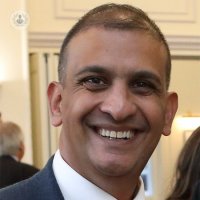What is a cholecystectomy, and why is it performed?
Written by:In one of our latest articles below, Professor Mansoor Khan, a highly experienced and revered consultant general, upper gastrointestinal, and trauma surgeon, details what a cholecystectomy is, why it is typically performed, and how long the procedure takes.

What is a cholecystectomy?
A cholecystectomy is a surgical procedure to remove the gallbladder. The gallbladder is a small organ located on the right side of the abdomen, under the liver.
The gallbladder stores bile, which is produced by the liver and helps with digestion. A cholecystectomy may be necessary if the gallbladder becomes damaged or diseased, or if it is causing problems such as gallstones.
There are two main types of cholecystectomies: open cholecystectomy and laparoscopic cholecystectomy. An open cholecystectomy involves a larger incision in the abdomen, while a laparoscopic cholecystectomy is a minimally invasive procedure that uses several small incisions and a laparoscope (a small camera) to visualize the inside of the abdomen.
Why is a cholecystectomy performed?
A cholecystectomy may be necessary for a variety of reasons. Some common indications for the procedure include:
- gallstones
- inflammation of the gallbladder
- other gallbladder problems
How long does a cholecystectomy take?
The duration of a cholecystectomy can vary depending on the type of procedure being performed and the person's specific medical circumstances. In general, a laparoscopic cholecystectomy takes less time to perform than an open cholecystectomy.
A laparoscopic cholecystectomy typically takes between 30 minutes and two hours to complete. An open cholecystectomy may take longer, typically between two and four hours.
What side effects does a cholecystectomy have?
There are, unfortunately, quite a few side effects associated with a cholecystectomy. These include:
- pain
- nausea and vomiting
- wound infection
- bleeding
If the gallbladder is removed, what diet should you follow?
After a cholecystectomy, it is important to follow a healthy and balanced diet to help your body function properly. You may need to make some dietary changes to help your body adjust to the absence of the gallbladder.
Here are some general recommendations for a post-cholecystectomy diet:
- Eat small, frequent meals.
- Choose low-fat foods.
- Avoid high-fibre foods.
- Drink plenty of fluids
- Avoid alcohol and caffeine
Years after a cholecystectomy, why is pain still experienced?
It is not uncommon for people to experience abdominal pain after a cholecystectomy. This pain can be caused by a variety of factors.
If you are experiencing pain years after a cholecystectomy, it is important to speak with your healthcare provider. They can evaluate your symptoms and determine the cause of the pain. In some cases, they may recommend medications or other treatments to help manage the pain. It may also be helpful to make lifestyle changes, such as eating a healthy diet, getting regular exercise, and managing stress, as these measures can help reduce abdominal pain.
To book an appointment with Professor Mansoor Khan, visit his Top Doctors profile today.



